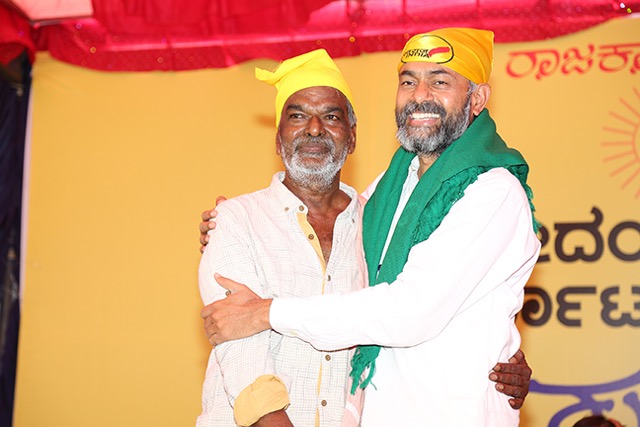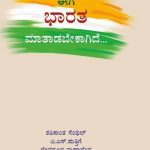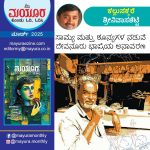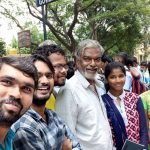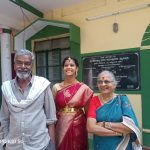An Interview with Swaraj India Presidium Member Devanoor Mahadeva: Alternative Politics
An Interview with Swaraj India Presidium Member Devanoor Mahadeva: Alternative Politics
Sarvodaya Karnataka Party, which was founded as a part of Karnataka’s alternative political experiments, merged with Swaraj India in early 2017. Devanoora Mahadeva, who was the president of Sarvodaya Karnataka, is one of Kannada’s eminent writers. He was conferred with the Padma Shri as well as the Sahitya Academy award returning both in protest against the growing intolerance in the country. This special interview, by writer-thinker Rahamat Tarikere, articulates Devanoora Mahadeva’s experiences and ideas regarding social movements and alternative politics.
In the methodology of your political thought, you refer to Gandhi, Lohia, and Ambedkar. The one missing in this list is Marx. Is it not possible for Marxist thought to join in as a force in alternative politics?
Why not? What I am saying is that Indian communists have become stagnant, that’s all. Here communism needs to assimilate India and find its own words and actions. Isn’t it so? That’s not happening. It’s like a goods carrier just carting a consignment. If you become like a tape recorder as soon as you start to speak, then how will it work? Doesn’t life transcend logic?
You are very drawn to Gandhiji, in fact, even your party’s name Sarvodaya too seems to have come from there. But do you think this is the reason why Dalits, who are tethered to the historic Gandhi-Ambedkar debate, have distanced themselves from you?
You seem to be plotting to distance me from the Dalit community through this very question (laughs) This is what happens if we place Gandhi and Ambedkar within the contemporary period, understanding and seeing them only as bodies. If we let go off logic, transform them into energy and look at their intentions and hopes then we won’t have that problem. If we distill them into spirit, into a cocktail that high could win over the world. A long time ago at Manipal when I had to speak about Gandhi, I weaved in Ambedkar bit by bit. There, U R Anantamurthy was translating it into English for the audience, who didn’t know Kannada and his eyes started brimming with tears. After I finished speaking, Anantamurthy said ‘Internally, I used to be a bit annoyed about Ambedkar; but today Ambedkar has a home in me.’ he said. What do you say to this?
Is the Sangh Parivar saffronising Ambedkar now?
True, true. First they tried to trample and liquidate him, painted him black. The more Ambedkar was trampled on the more he sprouted in people’s minds. The sangh parivar people, imposters, are now painting him saffron and are scheming to use him. Today everyone wants to paint Ambedkar with their colours. If there is a betrayal inside it’s not good for anyone.
‘Popular political idioms should be birthed from the stomach of India’s social, economic reality’ – is that what you are saying?
I recall an event – There was a classmate of mine called Nair from Kerala. CPI maybe. He would tease me that I was a Lohia-ite. I don’t know much about any ‘ite’/ism. I know a bit about the form of essences. One day in order to ridicule me he said “Do you know about your Lohia? He took from our Marx and distilled it. Yours is distilled arrack” he said. The correct phrase is ‘distilling’. Distilling with equipment from here, that is what is needed.
Recently, in India’s elections, Communist parties have suffered a setback. The reason?
I find it difficult to tell the reasons even for our own setbacks. (laughs) How do I talk about others? But it’s easier to talk about other’s setbacks so I’ll tell you! At the very least CPI and CPM should come together.
In what way can the left parties become one singular force in alternative politics?
Instead of terming the politics of the left parties as ‘alternative politics’ it could be more apt to say that compared to others they have more trustworthy politicians and a trustworthy ideology. Their contributions are immense. If the communists had not been that strong in the alliance with the congress government maybe by then itself LIC, banks etc would have been privatized. If they hadn’t stopped it, the way America’s became a pauper, maybe it would have happened to us also. America protects itself by smashing the heads of other nations. What would happen to countries like ours? Greece itself is faltering, caught within the whirlpool of globalization.
In Karnataka, how do Marxism and other politically liberating theories get into a discourse with each other?
Even though I don’t take up Marx’s name much, am I that much different in my intention from Marx? It’s only now that I consciously propose Marx. Recently, in Pandavapura, K.S Puttannaiah (then Sarvodaya Party, now Swaraj India MLA) celebrated Vishwamanava (Human of the World) Day. In a cart they put together photographs of spiritual saints and took out a procession. Marx was not there. Then I said, ‘the humans of the world have roamed the streets in a procession, withered away in the heat, drunk dust and come back. When they were alive too they seem to have suffered like this. These saints, these leaders most of them, they were self – reflexive. But the great saint Karl Marx who meditated on worldly equality, on being on par, was not seen here. Those saints, who went on this procession, should be admitted into hospital and be each given a bottle of Marx’s blood’ What we really need, is the spirit of Marx.
In politics, the Naxal movement also turned up as a search for an alternative. But it couldn’t grow roots in Karnataka. Some comrades have stepped out of there indicating their dissidence. They are speaking a terminology of new politics.
They are much more unfettered, and they spread themselves out I think. Where there is the oppression of landowners there the naxalite movement works a bit.
It could be Andhra, could be Bihar, could be Chattisgarh. If you assume oppression is there where it is not and respond that way then nothing really comes out of it. When armed struggle and violence is itself made into an ideology, personally, I find it difficult.
Are you saying that staying among people and fighting is more difficult than staying in the forests and fighting?
It’s very difficult. A bachelor can protect his celibacy easily where there are no women. Staying somewhere underground and saying that there is ‘no other go’ that is easy. But to manage disturbances among people for that you need a lot of skill and energy. For some the movement has been about going somewhere assuming that there is something going on there and then it becoming about being unable to return. The mind decides something in one instant. But will it be the same in the next moment too? I don’t know. But our society should be grateful for their concern for equality, their integrity, their intensity and their loyalty.
A nexus between politics and illegal money has been getting stronger in the recent times, garnering favourable public opinion. What are the challenges of searching for an alternative through electoral politics?
When having reached a state of being lost and directionless because of the impossibility of effecting changes in such a system, Aam Aadmi turned up like the light. Unforeseen possibilities, that transcend logic, do also happen.
What could be reasons for the Aam Aadmi win?
It was a wonderful combination of the vision of Yogendra Yadav-Prashant Bhushan team and Kejriwal’s political language via action which got the attention of the public. Maybe this is the reason. It was only through the coming together of both these that they were able to create a trust. This contribution by Yogendra Yadav and his friends is immense. Look at their manifesto. Our words are not there, that’s all. All our hopes are there. Another thing, what we have been constantly saying in our speeches is that the problem is that good people are not in politics. New faces joined Aam Aadmi like streams that flow into a river. This became the life force. If it had just been Kejriwal, without Yogendra Yadav and Prashant Bhushan, then he would have been just a popular stunt hero! The tragedy is he didn’t understand this.
Aam Aadmi is seen as a city centric party. Didn’t it take form without the Dalit-Farmer forces?
We can’t say that. We don’t know what it is like in Haryana or what it is like in Punjab or what it is like in UP. Delhi has a lot of auto drivers and a lot of people who are slum dwellers. They were the ones who supported the Aam Aadmi.
When Aam Aadmi won in Delhi, all the progressive people of Karnataka celebrated that victory didn’t they?
True. But after the split in Aam Aadmi, when Kejriwal removed Yogendra Yadav, Prashant Bhushan and their team, it was like he chopped off his own head and only saved his body. Then I thought these activists, socialists, communists they shouldn’t come to power. They should become a powerful opposition party. Today, in India, where is the opposition party? The communists have become stagnant. The state level parties engage in self serving dynastic politics. If one is the ruling party the other becomes the opposition and vice versa. The same run-of-the-mill dialogues. They treat politics like it is a drama company. Today in India we don’t have a meaningful opposition party. Within such a context, if in a hypothetical situation, Aam Aadmi had won only 25 seats then all those from Aam Aadmi would have stayed together. Then, the intellectual creative group who are now expelled from the party together with Kejriwal’s dynamic politics might have given birth to a model of how to act as an opposition party that could have influenced the whole of India.
Prashant Bhushan said that Aam Aadmi party should have lost. Did he say this with the same intention that you’ve said?
I’m not sure of the exact reason. If it follows on from this same meaning truly he’s a visionary. As far as I know, he said this predominantly because he was upset that tickets, to stand for elections, was given to those with allegations against them.
Is this Kejriwal fad a movement?
Aam Aadmi gave a political form to the anti-corruption movement that had flared up. That is easy. But what Yogendra Yadav and his friends are now doing with Swaraj Abhiyan, now that is a movement. This is challenging. What is needed now in India, is an appropriate national leadership that has the capacity and vision to bring together state level movements. It’s difficult to bring together local movements because they carry the baggages of legacies and differences. They would probably come together only when they are faced with distressful situations. State movements behave like islands in themselves. If there is national leadership then there won’t be a competition about legacies. Locally these movements have their own identities. But nationally, they can come together as an alliance. We need something like that for India. Only then will the movements hit upon an unprecedented power that will see the likelihood of their hopes and words coming into action. For today’s politics that has no reins, people’s movements can become the reins.
You had gone to Delhi to participate in Yogendra Yadav’s Samvad (Discussion). Does it feel hopeful?
Swaraj Abhiyan may not be able to do the kind of eye popping politics that Aam Aadmi did. But Swaraj Abhiyan is trying to bring together India’s local movements and trying to find a composite voice for that. Swaraj Abhiyan’s is like what they call a ‘slow victory’, something sustainable whose constructive politics, as articulated in its vision document, could end up saving India.
Photo credit: Rashmi Munikempanna
